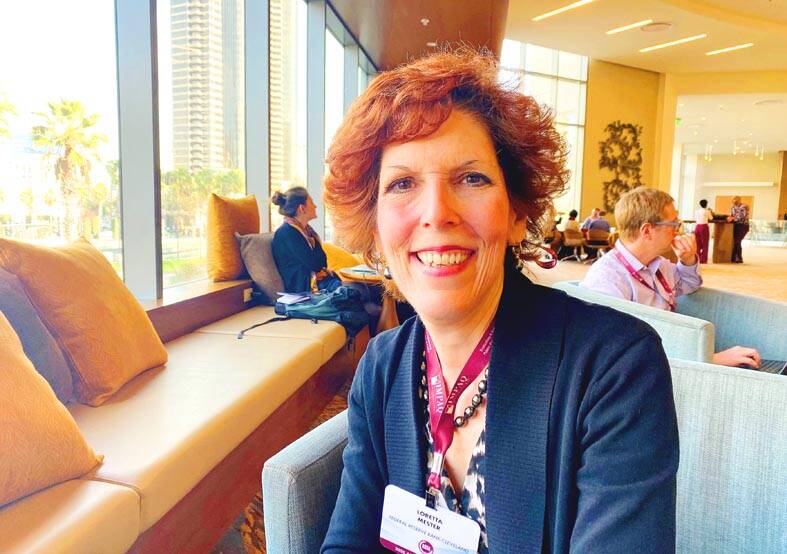Two US Federal Reserve officials reinforced expectations the central bank would slow their pace of interest rate increases next month, even as they stressed the need to keep tightening.
San Francisco Fed President Mary Daly and Cleveland Fed President Loretta Mester said during separate remarks on Monday that inflation remains too high and policymakers have a way to go before completing their tightening campaign.
However, they both characterized the need for officials to be judicious as they calibrate policy.

Photo: Reuters
“I think we can slow down from the 75 at the next meeting, I don’t have a problem with that,” Mester said during an interview with CNBC television, adding that policy was entering a new “cadence” now that rates have just entered restrictive territory, where they weigh on the economy.
The US central bank lifted interest rates by 75 basis points for the fourth straight time this month, bringing the target on its benchmark rate to a range of 3.75 percent to 4 percent.
Several Fed officials have signaled they might consider a 50 basis-point increase at their meeting next month, with the final decision depending on what happens with the US economy.
Investors expect the Fed to raise rates by a half-point at the Dec. 13-14 meeting and for the benchmark rate to peak at about 5 percent next year, according to pricing of contracts in futures markets.
Mester said she does not think market expectations are “really off,” adding that more interest rate increases are needed to bring rates deeper into restrictive territory.
“I don’t think we’re anywhere near to stopping,” Mester said. “We’re still going to have more work to do, because we need to see inflation really on a sustainable downward path back to 2 percent.”
Speaking earlier in the day, Daly said that officials would need to be mindful of the lags with which monetary policy works, while repeating that she sees interest rates rising to at least 5 percent.
“As we work to bring policy to a sufficiently restrictive stance — the level required to bring inflation down and restore price stability — we will need to be mindful,” she told the Orange County Business Council in Irvine, California. “Adjusting too little will leave inflation too high. Adjusting too much could lead to an unnecessarily painful downturn.”
“I tend to be on the more hawkish side of the distribution, if you will, as I think about what needs to be done here and where the risks lie,” she told reporters on a telephone conference call after the speech.
“Five percent to me is a good starting point,” she said, adding that it could go high if needed.
Fed officials in September projected rates of about 4.4 percent by the end of this year and 4.6 percent next year, according to their median forecast.
They update the quarterly estimates next month.

PATENTS: MediaTek Inc said it would not comment on ongoing legal cases, but does not expect the legal action by Huawei to affect its business operations Smartphone integrated chips designer MediaTek Inc (聯發科) on Friday said that a lawsuit filed by Chinese smartphone brand Huawei Technologies Co (華為) over alleged patent infringements would have little impact on its operations. In an announcement posted on the Taiwan Stock Exchange, MediaTek said that it would not comment on an ongoing legal case. However, the company said that Huawei’s legal action would have little impact on its operations. MediaTek’s statement came after China-based PRIP Research said on Thursday that Huawei filed a lawsuit with a Chinese district court claiming that MediaTek infringed on its patents. The infringement mentioned in the lawsuit likely involved

Taipei is today suspending work, classes and its US$2.4 trillion stock market as Typhoon Gaemi approaches Taiwan with strong winds and heavy rain. The nation is not conducting securities, currency or fixed income trading, statements from its stock and currency exchanges said. Authorities had yesterday issued a warning that the storm could affect people on land and canceled some ship crossings and domestic flights. Taiwan Semiconductor Manufacturing Co (TSMC, 台積電) expects its local chipmaking fabs to maintain normal production, the company said in an e-mailed statement. The main chipmaker for Apple Inc and Nvidia Corp said it has activated routine typhoon alert

GROWTH: TSMC increased its projected revenue growth for this year to more than 25 percent, citing stronger-than-expected demand for AI devices and smartphones The Taiwan Institute of Economic Research (TIER, 台灣經濟研究院) yesterday raised its forecast for Taiwan’s GDP growth this year from 3.29 percent to 3.85 percent, as exports and private investment recovered faster than it predicted three months ago. The Taipei-based think tank also expects that Taiwan would see a 8.19 percent increase in exports this year, better than the 7.55 percent it projected in April, as US technology giants spent more money on artificial intelligence (AI) infrastructure and development. “There will be more AI servers going forward, but it remains to be seen if the momentum would extend to personal computers, smartphones and

Catastrophic computer outages caused by a software update from one company have once again exposed the dangers of global technological dependence on a handful of players, experts said on Friday. A flawed update sent out by the little-known security firm CrowdStrike Holdings Inc brought airlines, TV stations and myriad other aspects of daily life to a standstill. The outages affected companies or individuals that use CrowdStrike on the Microsoft Inc’s Windows platform. When they applied the update, the incompatible software crashed computers into a frozen state known as the “blue screen of death.” “Today CrowdStrike has become a household name, but not in